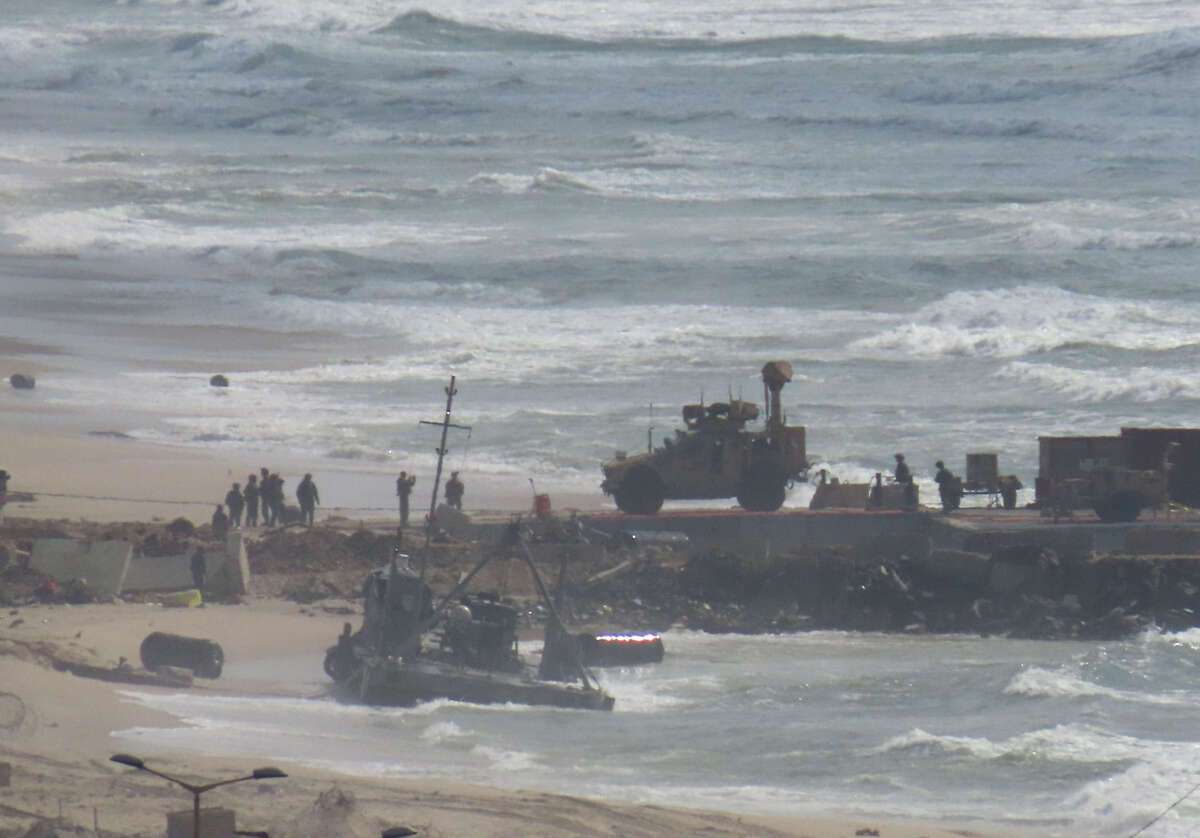Honest, paywall-free news is rare. Please support our boldly independent journalism with a donation of any size.
The U.S. military may be permanently dismantling its pier in Gaza soon, The New York Times reports, after the pier has delivered little but a series of embarrassing failures and an amount of aid so paltry that it has done essentially nothing to address the spread of famine across the region.
According to a Times report this week, military officials are telling aid groups that they may have to stop use of the $320 million pier as early as July — months earlier than the Biden administration’s predicted end date of September.
Pier operation was suspended last week for the fourth time since it was originally connected on May 17, due to heavy seas. It was reconnected again on Wednesday and began receiving aid on Thursday, according to the Associated Press, which cited a U.S. military official who spoke on “condition of anonymity to discuss U.S. military operations.”
The pier has delivered, in essence, no aid to Palestinians languishing under Israel’s extermination campaign. It has only been operational for roughly 11 of the 35 days since it was established — and little of the meager aid that has entered has been distributed to the Palestinian population at large, due to logistical issues and fears from humanitarian groups that they may be targeted by Israeli forces at the pier.
The UN has said that it is still assessing whether it can use the pier for deliveries of food and other goods due to recent reports that Israeli forces may have used the pier or the beach around it in an operation in which they killed at least 274 Palestinians and injured nearly 700 more in an attack on central Gaza earlier this month. Oxfam is also reconsidering use of the pier for this reason.
“You can be damn sure we are going to be very careful about what we assess and what we conclude,” said UN humanitarian chief Martin Griffiths, per AP. If the Israeli army were using the area or routes surrounding the pier for their operations, it “would put at risk any future humanitarian engagement in that operation,” Griffiths said.
Even if groups were able to make use of the pier, it would still not make much of an impact. Data from aid groups analyzed by analyst Stephen Semler shows that less than 1 percent of the food pallets delivered to Gaza in May came through the pier — and that was after the amount of food being delivered was drastically reduced due to Israel’s escalation of its aid blockade last month. In other words, the amount of aid entering Gaza has actually decreased after the connection of the pier, data shows.
U.S. officials have claimed that the pier was set up to combat the humanitarian catastrophe in Gaza. If increasing aid is indeed the main goal — something that some Palestinians have contested — then the pier is a total failure. Further, if increasing aid were a main goal of U.S. officials, then they would stop collaborating with Israel in its aid blockade and increase pressure to achieve a permanent ceasefire.
However, if the aid pier was actually just a cover for U.S. officials who wish to continue their participation in Israel’s genocide of Palestinians while appearing to care about the humanitarian situation, it has actually been a success, some have argued.
“The current conditions on the ground reflect Biden’s policy choices. Currently, Israel is bombing civilian centers using U.S.-made munitions, while getting aid to Palestinians in need is ‘almost impossible,’ and famine is imminent in Gaza everywhere it isn’t already happening,” Semler wrote in an op-ed last week. “Rather than change these conditions with a phone call to Israeli leadership, Biden told the U.S. military to build a pier.”
Indeed, looming over the pier debacle is the growing famine in Gaza. The UN has warned that, by next month, 1 million Palestinians in Gaza could be experiencing famine, with hundreds of thousands already under famine conditions for months now, experts have found. Tens of thousands of children in Gaza require treatment for dangerous levels of malnutrition — but are faced with little to no choice for treatment due to Israel’s purposeful dismantling of the Gaza health system.
Meanwhile, U.S. media sources have been touting a so-called tactical pause that some Israeli officials have claimed they are carrying out along a southern aid route in Gaza — a pause that other Israeli officials have outright denied is happening and that humanitarian aid groups have said they’ve seen no evidence of.
“We haven’t been able to get in,” World Food Programme Executive Director Cindy McCain told Al-Monitor on Thursday about the supposed pause. “We’ve had to reroute some of our trucks. They’ve been looted. As you know, we’ve been shot at, we’ve been rocketed. So as far as we can tell, there’s no difference at all.”
Speaking against the authoritarian crackdown
In the midst of a nationwide attack on civil liberties, Truthout urgently needs your help.
Journalism is a critical tool in the fight against Trump and his extremist agenda. The right wing knows this — that’s why they’ve taken over many legacy media publications.
But we won’t let truth be replaced by propaganda. As the Trump administration works to silence dissent, please support nonprofit independent journalism. Truthout is almost entirely funded by individual giving, so a one-time or monthly donation goes a long way. Click below to sustain our work.
